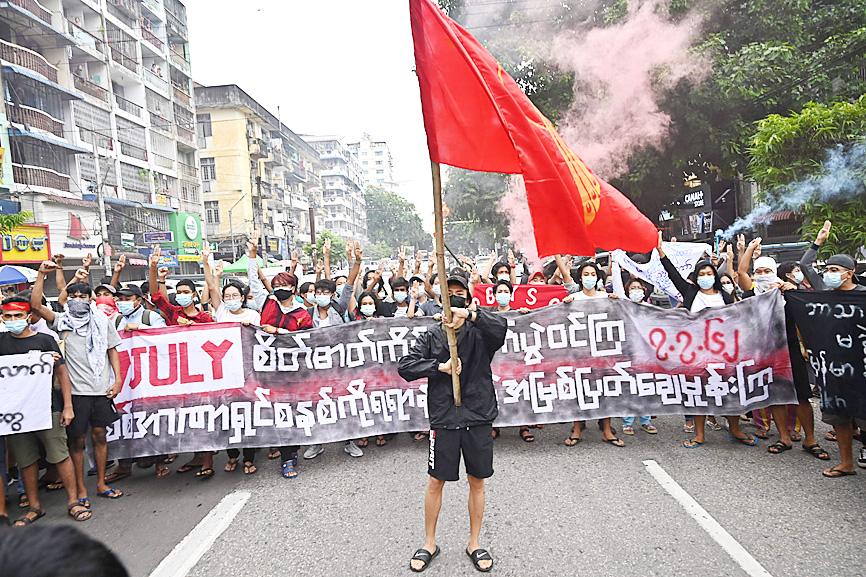Protesters yesterday took to the streets across Myanmar to mark the anniversary of 1962 student protests against the country’s first junta, vowing defiance against its latest incarnation more than five months after it seized power.
Myanmar has been in turmoil since generals in February ousted Aung San Suu Kyi’s government, with democracy protests met by a military crackdown that has killed more than 880 people, a local monitoring group said.
The economy is in freefall with thousands of civil servants and doctors on strike.

Photo: AFP
About 100 protesters moved quickly through the commercial capital, Yangon, early yesterday to mark the 1962 Yangon university protests against the first imposition of military rule in Myanmar, reporters said.
Hundreds were killed by troops and thousands disappeared in a brutal crackdown that many see being repeated almost seven decades later.
“Let’s root out the fascist army,” they chanted yesterday as some let off smoke bombs in orange and blue. “Keep the spirit of July 7 and fight the military dictatorship.”
Two minutes later they had gone — scattering quickly down side streets or jumping into waiting vehicles — as informants have tipped off police to previous flashmobs and protesters have been arrested.
Dozens also gathered in the second city of Mandalay holding signs, while in the central Sagaing region, protesters burned a Burmese army flag, images on local media showed.
Myanmar has been ruled almost continually by the military since 1962, just over a decade since independence.
It emerged from outright military rule in 2011, enacting economic and political reforms, including multiparty elections.
Aung San Suu Kyi’s National League for Democracy won a thumping majority in elections in 2015 and again last year, relegating the main military-backed party to the opposition.
Protests that drew hundreds of thousands onto the streets in February and March have given way to more nimble rallies in the face of a crackdown that has seen security forces use semi-automatic weapons on protesters.

Nvidia Corp yesterday unveiled its new high-speed interconnect technology, NVLink Fusion, with Taiwanese application-specific IC (ASIC) designers Alchip Technologies Ltd (世芯) and MediaTek Inc (聯發科) among the first to adopt the technology to help build semi-custom artificial intelligence (AI) infrastructure for hyperscalers. Nvidia has opened its technology to outside users, as hyperscalers and cloud service providers are building their own cost-effective AI chips, or accelerators, used in AI servers by leveraging ASIC firms’ designing capabilities to reduce their dependence on Nvidia. Previously, NVLink technology was only available for Nvidia’s own AI platform. “NVLink Fusion opens Nvidia’s AI platform and rich ecosystem for

‘WORLD’S LOSS’: Taiwan’s exclusion robs the world of the benefits it could get from one of the foremost practitioners of disease prevention and public health, Minister Chiu said Taiwan should be allowed to join the World Health Assembly (WHA) as an irreplaceable contributor to global health and disease prevention efforts, Minister of Foreign Affairs Lin Chia-lung (林佳龍) said yesterday. He made the comment at a news conference in Taipei, hours before a Taiwanese delegation was to depart for Geneva, Switzerland, seeking to meet with foreign representatives for a bilateral meeting on the sidelines of the WHA, the WHO’s annual decisionmaking meeting, which would be held from Monday next week to May 27. As of yesterday, Taiwan had yet to receive an invitation. Taiwan has much to offer to the international community’s

CAUSE AND EFFECT: China’s policies prompted the US to increase its presence in the Indo-Pacific, and Beijing should consider if this outcome is in its best interests, Lai said China has been escalating its military and political pressure on Taiwan for many years, but should reflect on this strategy and think about what is really in its best interest, President William Lai (賴清德) said. Lai made the remark in a YouTube interview with Mindi World News that was broadcast on Saturday, ahead of the first anniversary of his presidential inauguration tomorrow. The US has clearly stated that China is its biggest challenge and threat, with US President Donald Trump and US Secretary of Defense Pete Hegseth repeatedly saying that the US should increase its forces in the Indo-Pacific region

ALL TOGETHER: Only by including Taiwan can the WHA fully exemplify its commitment to ‘One World for Health,’ the representative offices of eight nations in Taiwan said The representative offices in Taiwan of eight nations yesterday issued a joint statement reiterating their support for Taiwan’s meaningful engagement with the WHO and for Taipei’s participation as an observer at the World Health Assembly (WHA). The joint statement came as Taiwan has not received an invitation to this year’s WHA, which started yesterday and runs until Tuesday next week. This year’s meeting of the decisionmaking body of the WHO in Geneva, Switzerland, would be the ninth consecutive year Taiwan has been excluded. The eight offices, which reaffirmed their support for Taiwan, are the British Office Taipei, the Australian Office Taipei, the